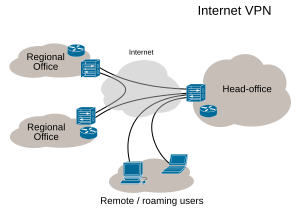Virtual private network facts for kids
A Virtual Private Network, or VPN, is a clever way to connect computers and devices over the internet, making it seem like they are all on the same private network. Even though your data travels across the public internet, a VPN keeps it safe and secret by using a special process called encryption. This means that anyone else on the internet can see your data moving, but they can't understand what it says because it's scrambled. To you, it feels like your computer is directly connected to the network you want to reach.
VPNs are designed to make sure a few important things happen:
- Keeping things private: The internet service provider (ISP) that carries your data can't read what you're sending or receiving. It's like sending a secret message in a locked box.
- Knowing who's who: Only people who are allowed can connect to the VPN. This helps keep unwanted guests out of the network.
- Making sure messages aren't changed: If someone tries to mess with your data while it's traveling, the VPN can tell you. It's like having a special seal on your locked box that breaks if someone opens it.
Companies often use VPNs to connect their different offices, or to let employees work from home and still access their work files and websites securely. It's like having a secure tunnel from their home computer right into the company's network.
VPNs also help you stay private online. They can hide your real location and make it much harder for anyone to track what you're doing on the internet. This helps keep your online activities anonymous and safe from prying eyes.
Many people use VPNs to reach websites or online services that might be blocked in their country, like in China. They are also very useful for protecting your internet activity when you're using public Wi-Fi, like at a coffee shop or airport. Public Wi-Fi can sometimes be risky, but a VPN adds a layer of security.
Sometimes, big companies use VPNs to connect their main office to other large branch offices far away. This is called a site-to-site VPN. It's much easier and safer than trying to build direct network connections between places that are physically very distant. Some common types of VPN technology include OpenVPN and IPsec.
Why People Use VPNs
People use VPNs for many different reasons, mostly to keep their online activities safe and private, or to access things they normally couldn't.
- Working from anywhere: If you're working from home or another remote place, a VPN lets you connect to your company's network securely.
- Connecting company offices: Businesses use VPNs to link their different locations together over the internet, making it easy for employees in different places to share information.
- Accessing your home network: You can even use a VPN to connect to your own home network when you're away, letting you access files on your home computer.
- Getting around blocks: VPNs can help you access websites or online content that might be blocked in your country or by your school's internet filter.
- Browsing privately: If you want to keep your internet browsing anonymous and make it harder for others to track you, a VPN can help.
- Staying safe on public Wi-Fi: When you use free Wi-Fi in public places, a VPN encrypts your data, protecting it from potential snoopers.
See also
 In Spanish: Red privada virtual para niños
In Spanish: Red privada virtual para niños
 | Kyle Baker |
 | Joseph Yoakum |
 | Laura Wheeler Waring |
 | Henry Ossawa Tanner |


